
Wondering when is the best time to send SMS? We dug into our data to discover the most popular days to send messages and how you can ensure your texts stand out.
Consumer expectations are at an all-time high and this extends to their communication preferences too. It’s about sending customers the right content at the right time. But when is the right time to send communications?
We took a deep dive into our own data to discover the most popular days to send SMS messages, broken down by industry and why that’s the case. Keep reading to learn our key insights.
Healthcare
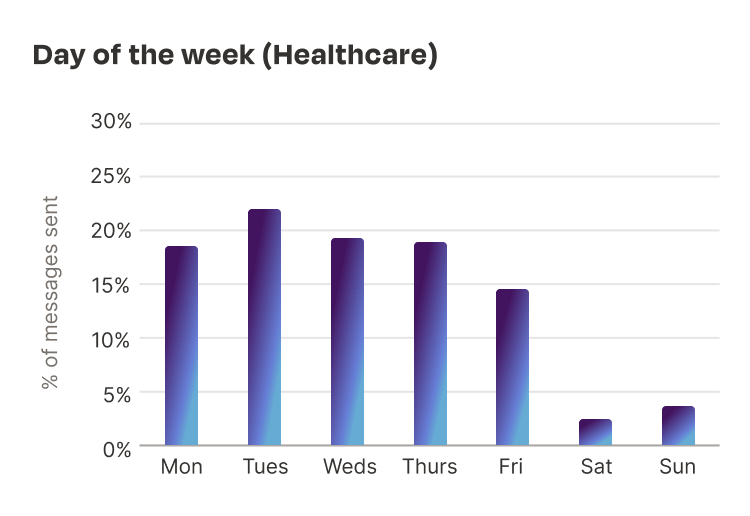
Healthcare providers tend to send SMS messages during the week, as opposed to weekends. In fact, midweek is the most popular, making up 77% of all messages sent (from Monday to Thursday), before dropping to just under 15% on Friday. Weekends are particularly quiet, with just 6% of healthcare providers sending text messages across these two days.
The most popular type of messages that healthcare providers send are reminders and notifications. Think along the lines of appointment reminders and notifications that prescriptions are ready to be picked up.
Appointments are always on a weekday so the reminders will usually come through on a weekday too (aside from Monday appointments, in which case, a reminder may be received on a Saturday/Sunday). A similar principle applies for prescription notifications too – as weekends are out of hours for GP surgeries.
What if you’re not sending an appointment or prescription-related notification? For example, what if you want to communicate a change in opening hours or you’re a private practice that wants to promote a particular offer?
If you want your texts to stand out among the appointment and prescription reminders, try scheduling them for the end of the week.
Retail
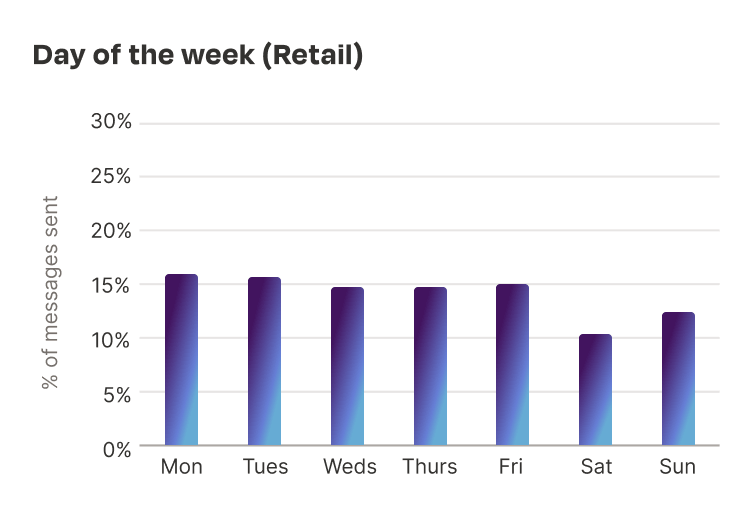
Retailers are relatively consistent when it comes to the days they send SMS messages. Like healthcare providers, retailers also seem to prefer a weekday send, with 76% of messages sent between Monday and Friday.
Weekends are slightly less popular, taking up 24% of the total message volume. However, this drop in volume is much less pronounced than other sectors.
Retail is one of our most diverse industries when it comes to subsector. For example, the retail space can encompass convenience stores, superstores, department stores, wholesalers, cosmetics, ecommerce and more! This naturally leads to a wider range of strategic messaging approaches.
For instance, promotional messages – like promo code and flash sale alerts – might work better when sent at the beginning of the week. This is because consumers naturally gravitate to the weekend to purchase goods so it makes more sense to remind them to browse at the start of the week compared to the end (when they’re likely to browse of their own accord anyway).
Drive-to-store notifications, however, may work better at the end of the week when consumers are winding down more likely to be free to visit stores in person.
Financial services
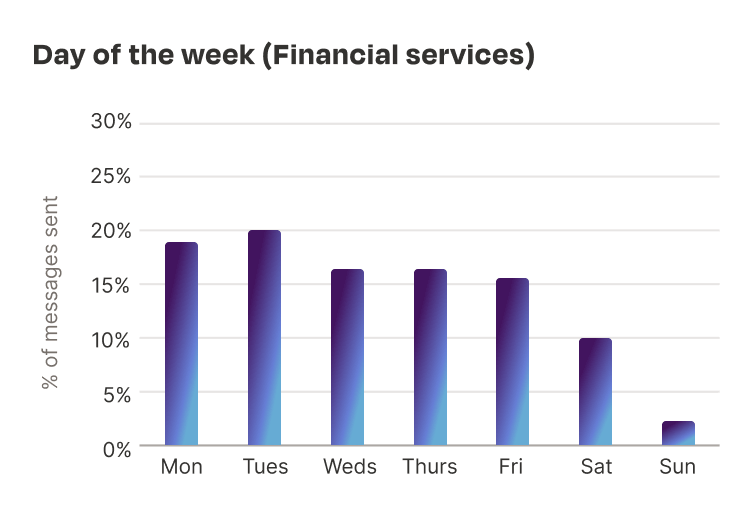
In the finance sector, we see some consistency across the week, with message volume tapering off as the week ends. The beginning of the week appears to be the most popular time to send SMS messages compared to the weekend (34% for Monday and Tuesday versus 12% for Saturday and Sunday).
Though over 37% of consumers would prefer to manage their financial affairs through a secure, automated portal (such as an app), people still prefer to perform any banking activities during the week. This is because banks in the UK are closed on Saturdays and Sundays, making it tricky if consumers need assistance over the weekend.
So, likely they would rather conduct most of their banking activities on a weekday when reaching out to customer service would be a lot easier and faster.
Insurance – Wednesday
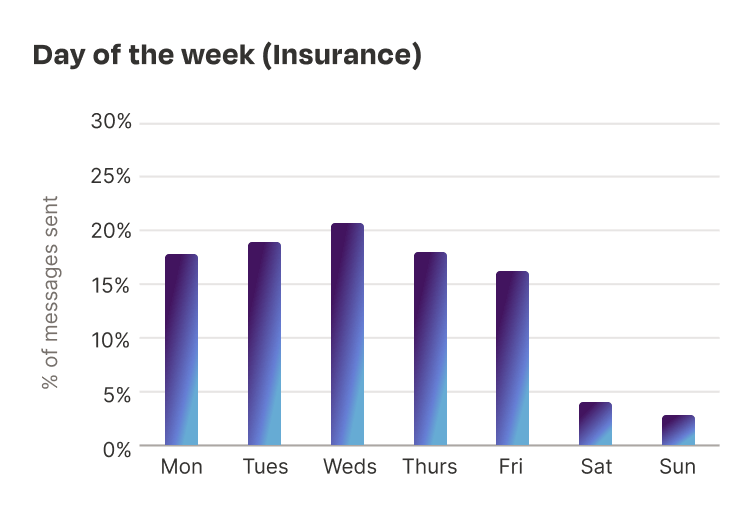
Like financial services, the insurance sector also sees higher message volume on weekdays, with a peak on Wednesday, before dropping by around 75% on Saturday and Sunday. This is likely because insurance quotes are said to be cheaper during the week. So, texts from insurance providers like one-time passcodes, two-factor authentication notifications and policy/quote follow-ups are more likely to come through on a weekday.
Transportation
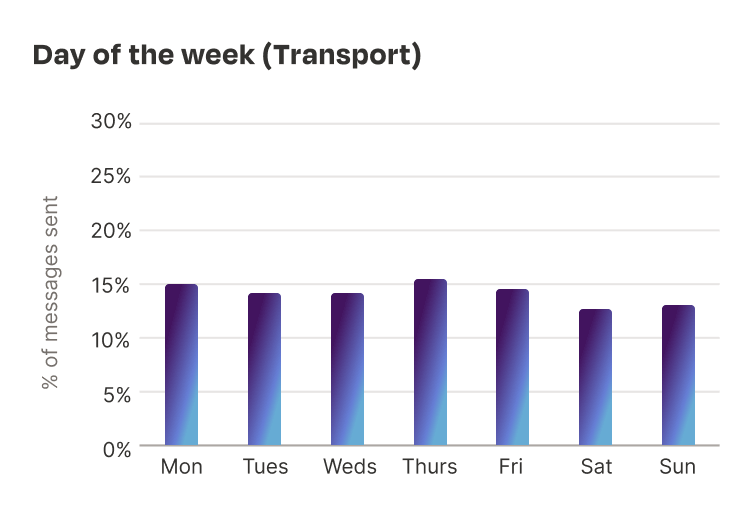
The transport industry, which covers air travel to local taxi companies, is pretty consistent in terms of SMS message volume. Thursday is the most popular, sitting at 16%, but Monday and Friday are close behind at 15%.
Transport isn’t bound to specific days of the week, unlike other industries. In other words, consumers will interact with transportation companies no matter the day. So, texts such as service updates (“Your taxi will arrive at [ADDRESS] at [TIME]”) can come through at any time.
SMS is also commonly used in the transport sector as an internal shift management platform, helping companies communicate with employees about working times and shift changes.
This variety in use cases contributes further to the stability of SMS message volume across the transport industry.
Utilities
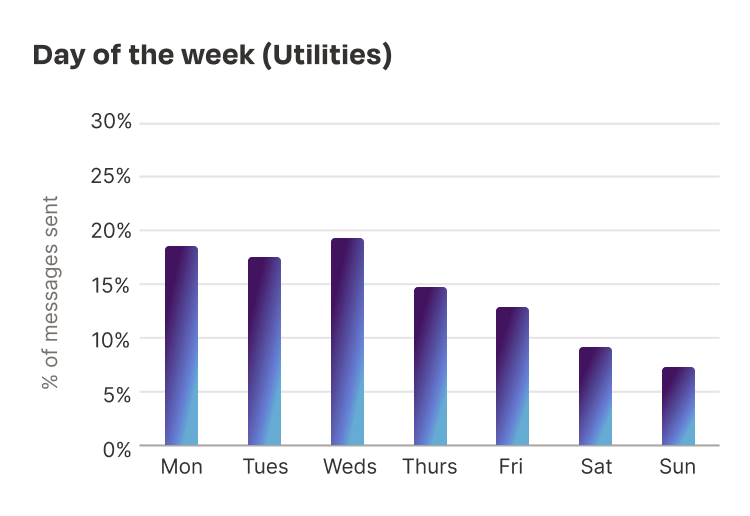
Utility providers appear to prefer sending SMS messages at the start of the week compared to the end, with 47% of all texts sent between Monday and Wednesday. Popular types of messages sent include:
- Electricity usage notifications.
- Engineer booking confirmations.
- Two-way conversations to triage customer service issues.
With engineers typically not working on the weekends, this would lead to fewer maintenance and booking-related SMS messages on these days. Overall, this would mean fewer texts sent at the weekend.
Recruitment
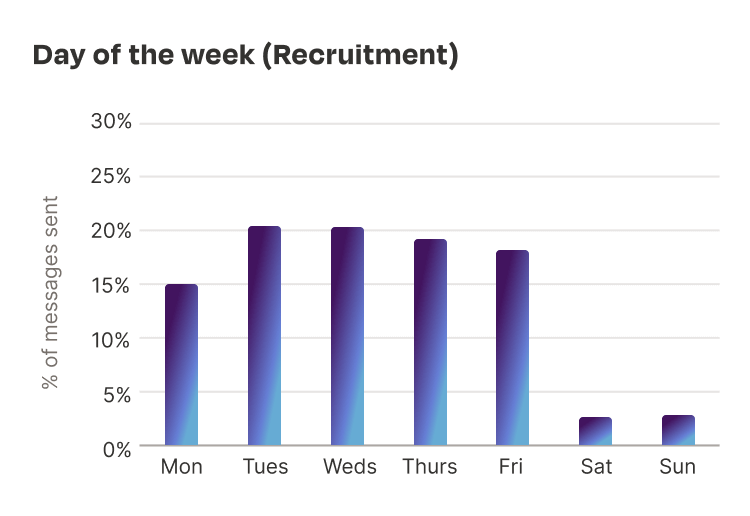
The majority (92%) of messages are sent by recruitment companies during the week compared to the weekend. This should come as no surprise, considering the weekend is typically out of hours for the recruitment space.
The most popular use case for recruitment companies is temporary staffing coverage – SMS is used to inform recipients of shifts available to them. In these scenarios, two-way conversational messages are used by the recruiter to send out the details of a job, which the applicant may then reply with YES or NO.
These types of messages make up a significant portion of the volume we see in the recruitment industry and is almost certainly why we see such strong performance on work days in comparison to the weekend.
However, SMS messages can be automated which is why we also see activity on weekends.
Why is Monday lower than the other weekdays?
Mondays are often notorious for being ‘catch up’ days in many companies – filled with inboxes to sort through. The simple answer is likely the same as why email open rates fall on Mondays – people are simply too busy.
For greater engagement, we advise that you send your SMS messages between Tuesday and Friday.
Entertainment
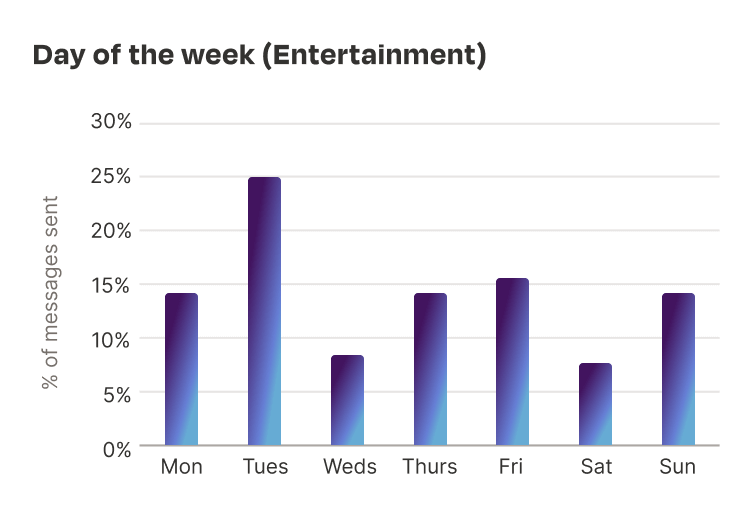
Another diverse industry, entertainment companies appear to favour Tuesday, with 25% of SMS messages sent on this day.
Heavily dominated by promotional-style campaigns, the data suggests that when it comes to SMS, the entertainment industry tends to have an “all-or-nothing” approach, with specific days (such as Tuesday) being more popular than others.
This results in bigger players skewing the data by launching en-masse SMS campaigns on days that they’ve found work best for them, leading to the large day-to-day fluctuations and an overall lack of a consistent trend across the week.
Interestingly, if you combine the volume of messages sent on Wednesday and Saturday, the two least popular days to send, it barely scratches 16% in total.
And Sunday, with 14% of all sends, has one of the highest share of messages sent on the weekend out of all the industries we’ve looked at. This is most likely an attempt to encourage consumers to engage before the start of a new work week when it’s likely that customers spend less time and money on entertainment compared to the weekend.
Key takeaways
Overall, it appears that weekdays are the most popular days to send SMS messages – perhaps largely due to the fact that people are busier at weekends and messages are more likely to be missed. Maximise the power of SMS and send your texts on a weekday.
Want to get even more out of this channel? Consider the type of message you’re sending as well as your industry.
Let’s say you’re a financial services provider. Just because Monday and Tuesday are the most popular days for our finance customers to send SMS doesn’t mean those days will work best for your use case. Perhaps you want to send a promotional offer. Or, you want to communicate a change in opening hours. Consider sending your texts at a less popular time so your message isn’t lost in a sea of other messages.
Or if you’re a retailer, give your SMS messages an extra edge by incorporating them into a multichannel communication strategy. Send an email to promote an upcoming product launch, then follow up with a text message closer to the launch date.
The potential of SMS is nearly limitless. Discover how the unparalleled flexibility that SMS as a channel provides can enable you to provide the best experience for your customers, from top-of-funnel leads, to conversion, and long after. Learn more by reaching out to us today.



